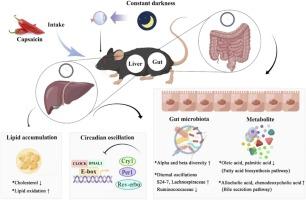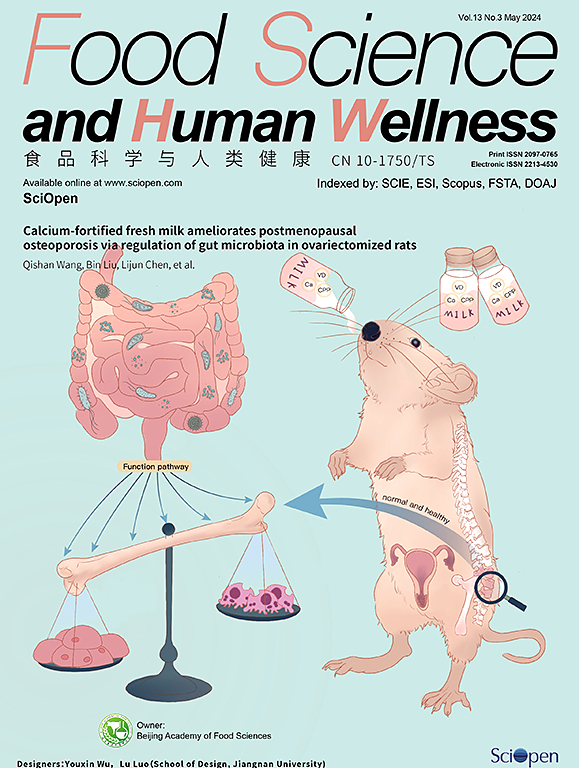Capsaicin alleviates the hepatic clock gene disruption and gut microbiota dysbiosis in circadian rhythm disorder mouse model
IF 7.4
1区 农林科学
Q1 FOOD SCIENCE & TECHNOLOGY
引用次数: 0
Abstract
As the body’s internal clock, the circadian rhythm regulates the energy expenditure, appetite, and sleep. There exists a close relationship between the host circadian rhythm and gut microbiota. In this work, a circadian disorder mouse model induced by constant darkness (CD) was constructed to investigate the regulating effects of capsaicin (CAP) on disturbances of metabolism homeostasis and gut microbiota in the respect of circadian rhythm-related mechanisms. Our results indicated that CAP reduced weight gain induced by circadian rhythm disorder in mice by inhibiting fat accumulation in liver and adipose tissue. The rhythmic expressions of circadian clock genes and lipid-metabolism related genes in liver were also recovered by CAP. Microbial study using 16S rRNA sequencing revealed that CAP modulated the gut microbiota richness, diversity and composition, and restored diurnal oscillations of gut microbes at the phylum and family level. These results indicated that CAP could alleviate CD-induced hepatic clock gene disruption and gut microbiota dysbiosis in mice, providing theoretical basis for CAP to be used as a muti-functional ingredient with great health-promoting effects.

辣椒素缓解昼夜节律紊乱小鼠模型中的肝脏时钟基因紊乱和肠道微生物群失调
作为人体的内部时钟,昼夜节律调节着能量消耗、食欲和睡眠。宿主的昼夜节律与肠道微生物群之间存在着密切的关系。本研究构建了一个由持续黑暗(CD)诱导的昼夜节律紊乱小鼠模型,以研究辣椒素(CAP)在昼夜节律相关机制方面对代谢平衡紊乱和肠道微生物群的调节作用。结果表明,辣椒素通过抑制肝脏和脂肪组织的脂肪积累,减少了昼夜节律紊乱引起的小鼠体重增加。CAP 还能恢复肝脏中昼夜节律基因和脂质代谢相关基因的节律表达。使用 16S rRNA 测序法进行的微生物研究表明,CAP 可调节肠道微生物群的丰富度、多样性和组成,并在门和科水平上恢复肠道微生物的昼夜振荡。这些结果表明,CAP 可以缓解 CD 引起的小鼠肝脏时钟基因紊乱和肠道微生物群失调,为 CAP 作为一种具有巨大健康促进作用的多功能成分提供了理论依据。
本文章由计算机程序翻译,如有差异,请以英文原文为准。
求助全文
约1分钟内获得全文
求助全文
来源期刊

Food Science and Human Wellness
Agricultural and Biological Sciences-Food Science
CiteScore
8.30
自引率
5.70%
发文量
80
审稿时长
28 days
期刊介绍:
Food Science and Human Wellness is an international peer-reviewed journal that provides a forum for the dissemination of the latest scientific results in food science, nutriology, immunology and cross-field research. Articles must present information that is novel, has high impact and interest, and is of high scientific quality. By their effort, it has been developed to promote the public awareness on diet, advocate healthy diet, reduce the harm caused by unreasonable dietary habit, and directs healthy food development for food industrial producers.
 求助内容:
求助内容: 应助结果提醒方式:
应助结果提醒方式:


